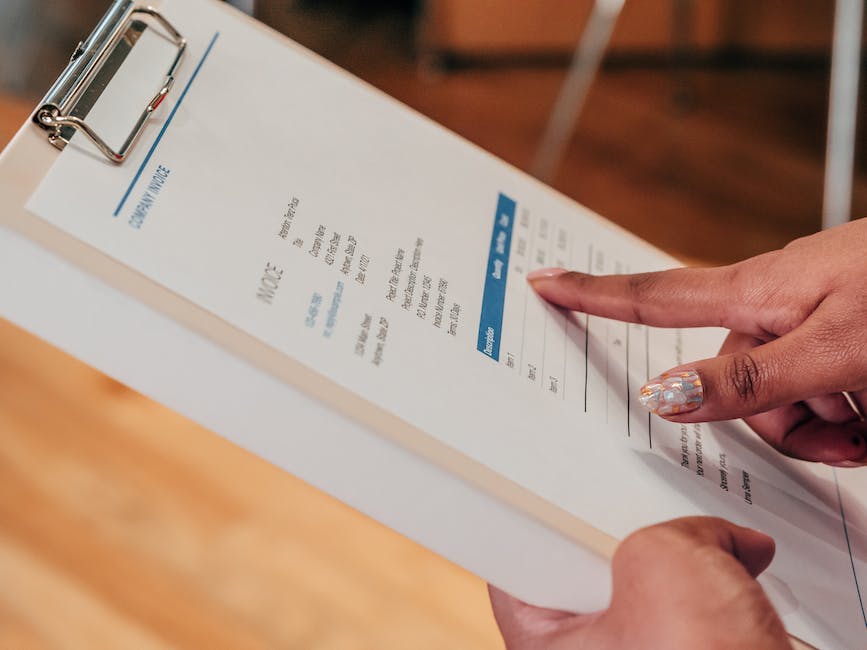What’s an Invoice Number?

For freelancers, keeping track of invoices is more than a mere administrative task—it’s a crucial aspect of running a successful business. An invoice is a document that provides a detailed account of the services provided and the amount due. Among its many components, the invoice number holds a significant role. In this post, we’re going to focus on the invoice number and its invaluable contribution to efficient invoice management.
Invoice numbers may seem like a small detail, but they’re a big part of maintaining a smooth, organized financial workflow. They help you keep track of your income, manage your financial records and ensure you get paid on time. So, what exactly is an invoice number, and why should freelancers pay attention to it?

Understanding the Invoice Number
An invoice number is a unique identifier that sets one invoice apart from the rest. Think of it as a fingerprint—it’s unique to each invoice and serves to differentiate one financial transaction from another. It’s not just a random string of numbers, but a crucial tool for maintaining order in your financial records.
The Relevance of Invoice Numbers for Freelancers
Invoice numbers are indispensable for freelancers. They play a vital role in organizing financial transactions, enabling you to track when payments are made, prevent duplicate payments, and support your tax preparation. Ever had the struggle of identifying which client has paid and which hasn’t? Or the confusion of dealing with two invoices with the same number? It’s the invoice number that comes to your rescue. It’s not just a number—it’s your ally in managing your freelance business.
Components of an Effective Invoice Number
What makes a good invoice number? The answer is simple – it must be unique, easy to understand, and it should follow a consistent system. An efficient invoice number is more than just a random sequence of digits. It holds an essential place in the financial management of your freelance business and should be treated with the same seriousness. So, what are the standard practices in creating invoice numbers? Let’s discuss.
Sequential Numbering
One of the most common methods used by freelancers is sequential numbering. This system involves simply increasing the invoice number one by one for each new invoice. For instance, the first invoice would be ‘001’, the second ‘002’, and so forth. The beauty of this approach lies in its simplicity and ease of use. It’s straightforward, uncomplicated, and requires minimal effort to implement.
Date-Based Numbering
Another popular strategy is the date-based numbering system. Here, the invoice number includes the invoice date in some format, often followed by a unique sequence number. For example, an invoice issued on the 5th of March 2021 could have an invoice number like ‘050321-001’. This method is particularly useful if you want to quickly identify when an invoice was issued just by looking at the invoice number.
Coded Numbering
The third method is coded numbering. In this system, the invoice number might include codes that specify the project, the client, or other significant information. For example, an invoice for a graphic design project for Client X issued in March might have an invoice number like ‘GDX-0321-001’. This method requires a bit more effort to implement but can provide valuable information at a glance.
Tips to Create and Organize Invoice Numbers
Now that you understand the different components of an invoice number, how do you go about creating and organizing them? Here are some practical tips.
Firstly, choose a system that suits your needs. The method you choose should be easy for you to maintain and should make sense for your business. Secondly, consistency is key. Once you choose a system, stick with it. This helps to avoid confusion and makes it easier to track your invoices later on. Lastly, always ensure that each invoice number is unique. Duplicate invoice numbers can lead to confusion and could complicate your financial tracking.
Let’s look at a comparison of the different methods discussed.
| Method | Pros | Cons |
|---|---|---|
| Sequential Numbering | Simple and easy to use | Lacks additional information |
| Date-Based Numbering | Provides date information at a glance | Can be more complex to implement |
| Coded Numbering | Provides detailed information | Requires more effort to maintain |
Invoice Numbering Software and Tools
With the rise of digital platforms and innovative technology, managing invoice numbering has become more streamlined than ever. There are numerous software and online tools available that can help freelancers handle their invoice numbering efficiently. These tools not only automate the process of creating unique invoice numbers but also aid in tracking and managing invoices, thereby ensuring you never lose sight of your payments.
Some popular invoicing tools among freelancers include QuickBooks, Wave, and Zoho Invoice. These platforms not only simplify invoicing but also offer a host of other features such as time tracking, expense tracking, and financial reports. What’s more, they can be accessed anywhere, anytime, making it easy for freelancers to stay on top of their finances.
Have you ever considered the impact an automated invoicing system could have on your workflow? Think about it: no more manually creating invoice numbers, less chance of error, and more time to focus on your work. Sounds like a win-win, doesn’t it?
Common Mistakes to Avoid in Invoice Numbering
While the concept of invoice numbering might seem straightforward, it’s not uncommon for freelancers to make mistakes. These errors can lead to confusion, missed payments, and even legal issues. Let’s look at some of the most common mistakes and how to avoid them.
Skipping numbers: Every invoice you issue should have a unique number. Skipping numbers can lead to confusion and make it hard to track your invoices. Always ensure your invoice numbers follow a logical and consistent sequence.
Duplicate numbers: Just as you shouldn’t skip numbers, you also shouldn’t use the same number for different invoices. Duplicate numbers can lead to misunderstandings and payment issues. An invoice numbering system or software can help prevent this problem.
Not using a consistent system: Consistency is key when it comes to invoice numbering. Whether you opt for sequential, date-based, or coded numbering, stick to one system and follow it religiously. A consistent numbering system makes it easier to manage and locate invoices.
Remember, avoiding these mistakes can save you a lot of trouble down the line. So, keep these points in mind and ensure your invoice numbering is always on point.

The Legal Importance of Invoice Numbers
Invoice numbers are not just important for organizational purposes, but they also have legal implications. Depending on the jurisdiction in which you operate, these numbers may be a requirement for tax purposes. In many countries, for example, businesses are legally required to maintain a sequential order of invoice numbers to ensure transparency and prevent fraud.
What does this mean for you as a freelancer? It means that the way you manage your invoice numbers can have a direct impact on your legal compliance. For instance, skipping invoice numbers or using duplicate numbers can cause complications during tax audits and can potentially lead to financial penalties. Therefore, it is absolutely crucial to have a consistent and systematic approach to invoice numbering.
Moreover, invoice numbers can play a crucial role in any dispute resolution. In case of any disagreement with a client over payment, the invoice number serves as a unique identifier that can be referenced in any legal documentation or proceedings. Therefore, never underestimate the importance of an accurate and consistent invoice numbering system!
Conclusion: The Vital Role of Invoice Numbers in Freelance Work
Throughout this post, we’ve explored the intricacies of invoice numbers and their importance in managing your freelance business. Starting from understanding what an invoice number is, to exploring various numbering methods, and finally touching upon the legal significance of invoice numbers, it’s clear that invoice numbers are more than just numbers.
They are a vital part of your financial workflow, helping you keep track of your payments, avoid duplicates, and stay organized. They also play a crucial role in maintaining transparency, ensuring legal compliance, and resolving disputes. As such, it’s more than just good practice to have a consistent and systematic approach to invoice numbering – it’s a necessity.
Now that you’re familiar with the importance of invoice numbers, are you ready to re-evaluate your current system? Do you see room for improvement? Remember, a small change today can lead to a smoother financial management tomorrow.
Key Points to Remember Regarding Invoice Numbering
- Invoice numbers are unique identifiers for each invoice.
- Consistency and systematization are key in invoice numbering.
- Invoice numbers are not just important for organization, but also for legal compliance.
- Having a systematic approach to invoice numbering can help prevent disputes with clients.
- There are various methods of invoice numbering, each with its pros and cons – choose the one that suits your needs the best.
Get Organized & Win More Clients
Kosmo has everything you need to run your freelancing business.